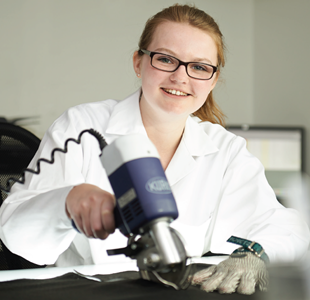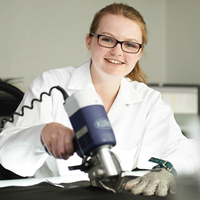How would you describe a typical day at work, and what are typical tasks of a warehouse clerk at TWE?
Like all industrial apprentices at TWE, I work during the day shift. This means that my day starts at 7:00 a.m. and ends at about 3:30 p.m. At 9:00 a.m. I have a breakfast break of 15 minutes and can fill up on some energy for the day ahead. Lunch break is from 12:00 p.m. to 12:30 p.m.. Ideally, I like to spend this time with my colleagues. My daily tasks include the picking and packing of goods for an order. I pack our deliveries and prepare them for shipment. With the delivery of our raw materials and fibres, I am responsible for transport within the company.
What do you enjoy most about the work? What do you like best?
My colleagues are very pleasant and willing to help. I enjoy being able to learn something new from them every day.
How are you supported at TWE during your appreticeship?
My training supervisor is always there for me when I have questions or problems. But my other colleagues, with whom I work together daily, are also always very helpful and kind.
What tips can you give applicants who are applying for this apprenticeship?
Being a qualified warehouse operator at TWE, it is also typical to work in the shift system (thus early, late and night shift), and of course one should be prepared to do this. Team spirit, staying cool during stressful situations and working autonomously are also prerequisites you should bring along.
When you think back, what were your first days at TWE like?
During my first days at TWE, there naturally were a great number of impressions. The premises are very extensive. and interesting plants are distributed throughout. I was already fully integrated in the tasks on the first day at work, and integrated within the team. Since I wasn't of legal age at the start of my apprenticeship yet, I was initially only allowed to operate the lifting cart. Today I have a fork-lift licence, which simplifies my work significantly.
Where is your main place of work?
My main place of work is the warehouse and production site. You will most likely find me on the fork-lift there, where I busy pre-picking the non-women fabrics for transportation or supplying the machines with the required fibre bales.
What things hadn't you expected beforehand? What surprised you about the apprenticeship?
I didn't expect to be integrated so actively in the existing team. I was immediately integrated in daily business and was already allowed to carry out small tasks by myself on my first day. Now, after almost one year, I realise how much I have learnt within this short time and also how wonderfully we have grown together as a team. I didn't expect that at the outset.
Which vocational college do you attend? What is a typical day like at your vocational college?
I am attending the Ludwig Erhard School in Neuwied together with my apprenticeship colleagues. There I have vocational school two days a week until the afternoon.
Which subjects are you studying at vocational college?
At school, with the subjects warehouse logistic business processes, goods handling organisation, economics and business operations as well as data processing, I get all the basics I need for my apprenticeship. The number of school periods and the type of teaching subject vary from one apprenticeship year to the next.
To what extent have you developed further at a personal level during your apprenticeship?
From the first day on, I was shown that the others rely on me as a colleague. This means that, although I am an apprentice and of course cannot and also don't have to be perfect at everything already at the beginning, the others expect a sense of responsibility and dedication from me. Because I already demonstrated that I can work independently and responsibly after a short time, little by little, I was also given more and more difficult tasks. Of course this challenges me but it is also great fun! In the meantime, more and more frequently, also during my leisure time, I notice that I have learnt to assume responsibility and have adopted a more independent approach.



















